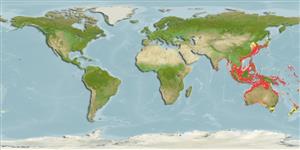Teleostei (teleosts) >
Eupercaria/misc (Various families in series Eupercaria) >
Haemulidae (Grunts) > Haemulinae
Etymology: Pomadasys: Greek, poma, -atos = cover, operculum + Greek, dasys = with hair (Ref. 45335).
More on author: Cuvier.
Environment: milieu / climate zone / depth range / distribution range
Ecology
Marine; brackish; benthopelagic. Tropical
Western Pacific: China, Thailand, Singapore, Malaysia, and New South Wales, Australia.
Size / Weight / Age
Maturity: Lm ? range ? - ? cm
Max length : 52.0 cm TL male/unsexed; (Ref. 47695); common length : 43.0 cm TL male/unsexed; (Ref. 47695)
Dorsal spines (total): 12; Dorsal soft rays (total): 14; Anal spines: 3; Anal soft rays: 7. Body color silvery to light burnished gold; dorsal fins with well defined blackish spots on interspinous membranes; adults with blackish spot on tip of each scale on back and upper sides. Body depth 3.2 tomes in SL. Head large; upper profile convex; gill cover and angle of preopercle lengthened as convex rounded lobe; gill cover extending to above 1/3 to 1/2 of pectoral fins. Mouth small; maxilla reaching to eye. Pores 2 and a median pit on chin (Ref. 47695).
A rare species apparently inhabiting deeper waters of the continental shelf (Ref. 47695).
Life cycle and mating behavior
Maturity | Reproduction | Spawning | Eggs | Fecundity | Larvae
Oviparous, distinct pairing during breeding (Ref. 205).
McKay, R.J., 2001. Haemulidae (=Pomadasyidae). Grunts (also sweetlips, hotlips, and velvetchins). p. 2961-2989. In K.E. Carpenter and V.H. Niem (eds.) FAO species identification guide for fishery purposes. The living marine resources of the Western Central Pacific. Volume 5. Bony fishes part 3 (Menidae to Pomacentridae). Rome, FAO. pp. 2791-3380. (Ref. 47695)
IUCN Red List Status (Ref. 130435: Version 2024-1)
Threat to humans
Harmless
Human uses
Fisheries: of no interest
Tools
Special reports
Download XML
Internet sources
Estimates based on models
Preferred temperature (Ref.
123201): 16.3 - 28.3, mean 26.5 °C (based on 946 cells).
Phylogenetic diversity index (Ref.
82804): PD
50 = 0.5000 [Uniqueness, from 0.5 = low to 2.0 = high].
Bayesian length-weight: a=0.01660 (0.00778 - 0.03542), b=3.02 (2.84 - 3.20), in cm total length, based on LWR estimates for this (Sub)family-body shape (Ref.
93245).
Trophic level (Ref.
69278): 3.5 ±0.5 se; based on size and trophs of closest relatives
Resilience (Ref.
120179): Medium, minimum population doubling time 1.4 - 4.4 years (Preliminary K or Fecundity.).
Fishing Vulnerability (Ref.
59153): Moderate vulnerability (41 of 100).
